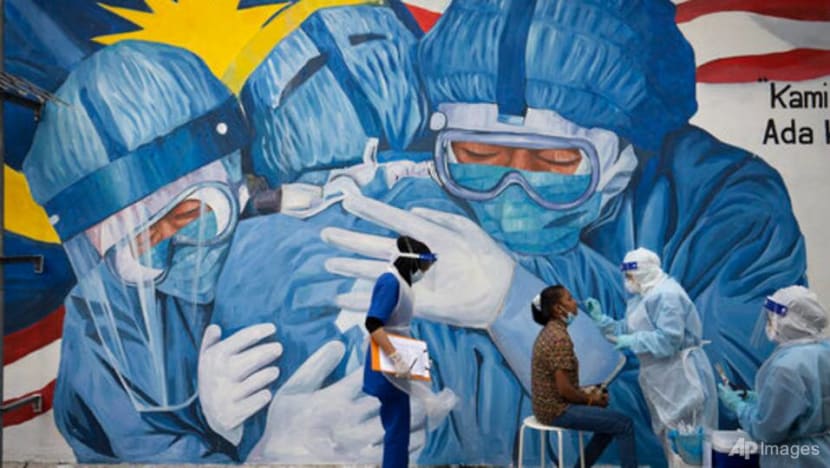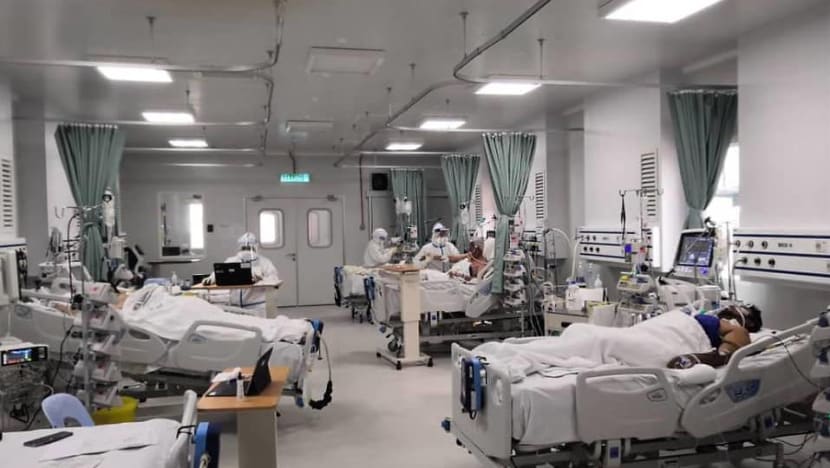Commentary: GE15 - Fixing Malaysia’s healthcare system will require money, not just election pledges
The good news is that political coalitions have pledged to improve healthcare in their election manifestos. The bad news is that Malaysians don’t know how this will be paid for, says journalist Loh Foon Fong.

A clinic doctor collects a COVID-19 swab sample from a patient in Selangor, Malaysia on Dec 12, 2020. (Photo: AP/Vincent Thian)
KUALA LUMPUR: As Malaysians go to the polls on Saturday (Nov 19) for the 15th General Election (GE15), analysts say how their leaders handled the COVID-19 pandemic, especially the economic fallout, will weigh on voters’ minds.
But candidates and voters should also not forget the lessons that came with a heavy price. Malaysia’s underfunded and overcrowded public healthcare system was tested beyond its limits, with nearly 5 million confirmed COVID-19 cases and more than 36,000 deaths, about 20 per cent of whom were brought-in-dead cases.
The good news is, election manifestos of the main coalitions - Barisan Nasional (BN), Pakatan Harapan (PH) and Perikatan Nasional (PN) - promise to increase public healthcare spending to 5 per cent of the gross domestic product (GDP); BN and PH within a five-year target while PN "in stages".
But none have spelled out how they will get the extra funding.
HEALTHCARE SYSTEM IN NEED OF URGENT ATTENTION
Several issues warrant urgent attention. Old public hospitals, clinics, machines and equipment need to be repaired or upgraded.

There is a high rate of chronic conditions, such as diabetes, high blood pressure and high cholesterol, which pose major risk factors for cardiovascular disease. One in five adults, or about 3.9 million people, suffer from diabetes, according to the 2019 National Health and Morbidity Survey (NHMS 2019) report.
Mental health issues also pose a growing challenge. The NHMS 2019 revealed that half a million Malaysians were found to be experiencing symptoms of depression. Malaysia recorded an 81 per cent increase in suicide cases in 2021 (1,142 cases) compared to 2020 (631 cases).
Meanwhile, Malaysia needs to prepare for its fast-ageing population, with those aged 60 and above expected to make up 15 per cent of the population by 2030, including accessibility issues in the rural areas.
Climate change and deforestation could also result in more severe flood events that raise the risk of infectious diseases and mental distress. Six states – Johor, Kelantan, Melaka, Penang, Perak, Selangor – have already been hit by floods during this GE15 campaigning period.
“CHRONIC UNDERINVESTMENT” IN HEALTHCARE SYSTEM
Except for climate change-related diseases, the PH and PN manifestos cover most of these concerns, including efforts to beef up primary care and preventive medicine, and help the poor and the aged better access healthcare.
They have pledged to set up a health services commission to better manage manpower, including the issue of many contract doctors being shut out of permanent posts in the public healthcare system which saw them stage a strike in July 2021 amid the deadly Delta wave.
In contrast, the BN manifesto has only a brief mention of health about increasing funding, building more specialist hospitals, and increasing specialty and subspecialty training opportunities in private hospitals. But BN has the advantage of being the ruling coalition, with caretaker health minister Khairy Jamaluddin, a BN candidate, promising to continue his healthcare reform efforts if he is elected and returned to the position.
In parliament in March, Khairy acknowledged a “chronic underinvestment” in Malaysia’s public healthcare system, with public sector healthcare spending at 2.6 per cent of GDP, below the minimally 4 per cent of countries with similar development levels.
Needless to say, all grand schemes need funds.
COULD GST BE RE-INTRODUCED?
Some key recommendations debated in Malaysia are a proposal for a social health insurance (SHI) and the re-introduction of the Goods and Services tax (GST).
The challenge with SHI will be in collection. Only 16.5 per cent, or 2.475 million out of Malaysia’s 15 million workforce, were subjected to individual income tax, based on the Fiscal Outlook 2020 report, according to a report in The Edge.
Even if the government picks up the tab for the low-income group (B40 or bottom 40 per cent), it is still unclear if SHI contributions will be adequate for risk pooling. Setting up and running a new SHI will also incur significant cost.
GST may be a possible source of funds as a broad-based consumption tax. But this will pose a burden at a time of rising prices and global economic uncertainty.
Critics argue that it disproportionately affects the low-income more than the high-income group and point to other sources like corporate tax, currently 24 per cent after gradual reductions from 40 per cent in the 1980s.
MORE PROGRESSIVE TAXES NEEDED
In January, prominent economist Dr Jomo Kwame Sundaram urged governments to be innovative in developing progressive means to finance the large-scale social spending needed to improve lives and livelihoods following the COVID-19 pandemic.
He said governments should target tax on excess profits and wealth, raising the concern that rich corporations and individuals paid less and less in direct taxes, while the public paid more and more in indirect taxation, typically on consumption.
A form of wealth tax could be a source of funding that support and enhance public healthcare and other services. But finding the right balance of how to do so will always be tricky, while watching out for unintended consequences like capital flight.
It should, of course, also be supported with efforts to curb wastage and corruption – another hot-button election issue for Malaysian voters.
The COVID-19 pandemic has exposed severe gaps in the healthcare system and fixing it requires political will. It has to be more than just election pledges.
Loh Foon Fong is a senior freelance health journalist based in Malaysia.




















